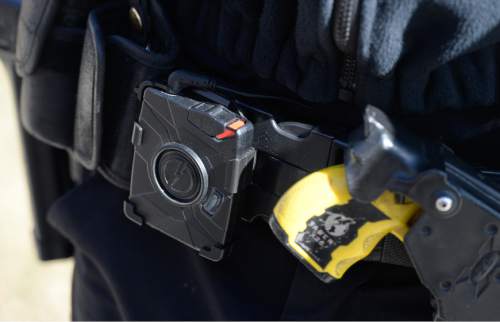This is an archived article that was published on sltrib.com in 2015, and information in the article may be outdated. It is provided only for personal research purposes and may not be reprinted.
Instead of creating detailed statewide standards about how and when police body cameras should be used, several Utah legislators said Wednesday they instead hope to require local law-enforcement agencies to write and follow their own rules.
That led some critics to say it could lead to uneven use of the cameras around the state, and possibly undermine the public's faith in police.
But Sen. Daniel Thatcher, R-West Valley City, pushed the approach, arguing that giving local departments discretion will lead more of them to use the cameras.
"I think that LaVerkin is going to have vastly different wants, needs and desires than Salt Lake City." For example, he said, they differ in abilities to afford cameras and store recordings.
Thatcher is drafting a body-camera bill, which has not yet been made public. Rep. Dan McCay, R-Riverton, is working on another. The Law Enforcement Interim Committee discussed general concepts Wednesday, not specific bills.
Thatcher said his bill will require law enforcement agencies using body cameras to develop their own written policies specifying when officers must wear them, when cameras should be activated, who may or may not review recordings and how long tapes should be retained.
Representatives of police agencies and several committee members hailed that approach.
"If we make this an onerous policy that is dictated by the state," fewer agencies will use them, said Bountiful Police Chief Tom Ross, representing police chiefs statewide. "We'll have fewer body cameras on law enforcement, so it doesn't really serve the purpose of those who want to see body cameras implemented."
But Sen. Luz Escamilla, D-Salt Lake City, said the hands-off approach could lead to public distrust, especially if body camera policies vary widely from city to city.
Rep. Angela Romero, D-Salt Lake City, said incidents of police excessive use of force have spurred public demand for body cameras and uniform policies in their use.
Ross and Salt Lake County Undersheriff Scott Carver said most police also want to use body cameras because they help officers prove innocence in the face of complaints. But they said they want to avoid making police feeling as though they are guilty until proven innocent.
Thatcher said affected groups are still working on several issues, including how to protect certain types of video from public release.



